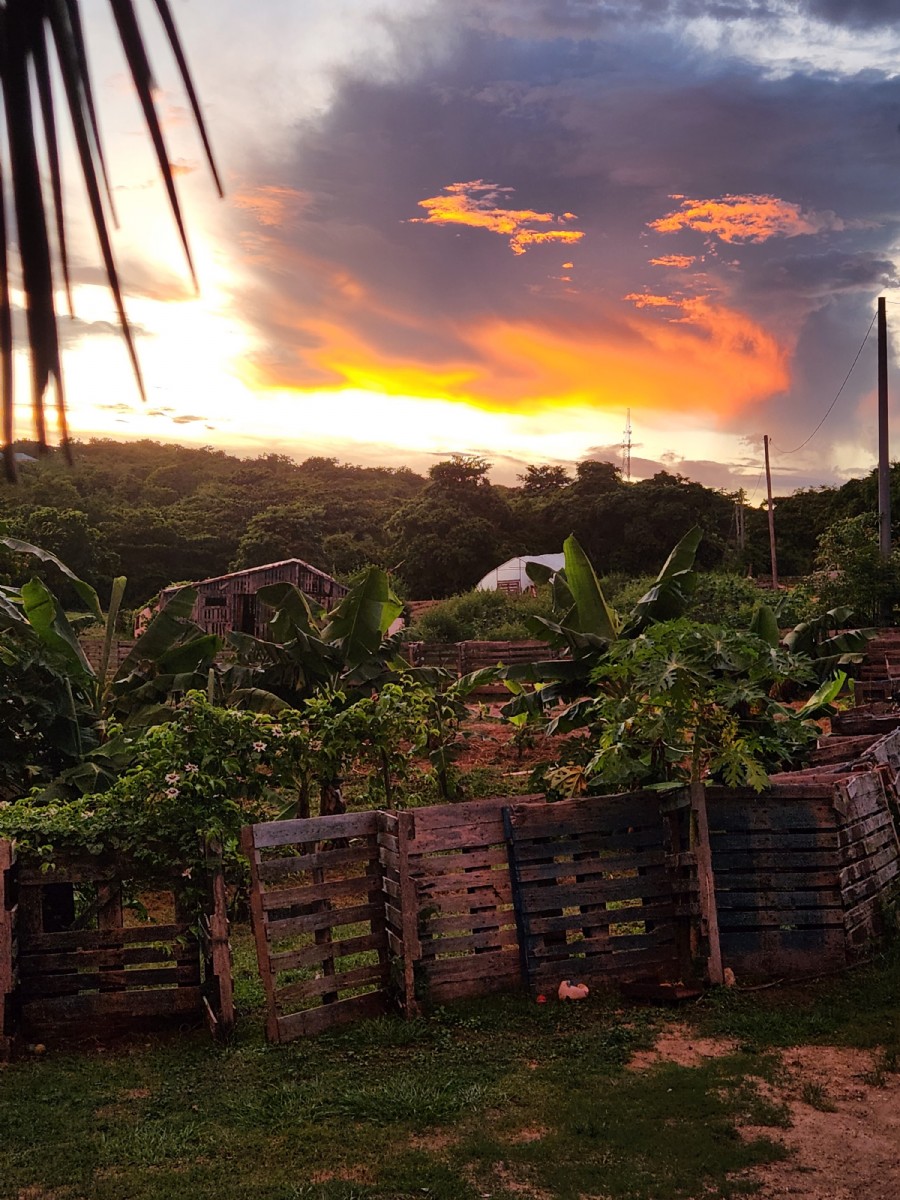Our Purpose: La Finca de Hamberto is a small-scale and self-sustained farm in Vieques, Puerto Rico. We are a proud member of the Vieques Agricultural Collective and home to the educational project Apoyo en Vieques para la Educación y la Sostentabilidad (Support in Vieques for Education and Sustainability or AVES). Our work combats food insecurities created by systemic racism and supply chain issues. 99% of food consumed in Vieques must be imported by ferry from mainland Puerto Rico, a process which is often unreliable in inclement weather and downright dangerous during hurricanes and other severe weather events. It is not unusual for produce to arrive already expired.
Vieques, Puerto Rico. We are a proud member of the Vieques Agricultural Collective and home to the educational project Apoyo en Vieques para la Educación y la Sostentabilidad (Support in Vieques for Education and Sustainability or AVES). Our work combats food insecurities created by systemic racism and supply chain issues. 99% of food consumed in Vieques must be imported by ferry from mainland Puerto Rico, a process which is often unreliable in inclement weather and downright dangerous during hurricanes and other severe weather events. It is not unusual for produce to arrive already expired.
Our mission is to rescue local farming knowledge of native plants and rebuild a community of farmers and ranchers to establish a sustainable and resilient island community. Vieques is historically home to thousands of cattle, boars, and trees which bear a year-round yield of sweet fruit and nutritious root vegetables. Our work is slowly restoring local markets and food networks that connect producers to conusmers and lower barriers to entry for veterans and underserved farmers.
.jpg) At the Farm: Our community farm project currently supplies more than ten restaurants and markets with weekly deliveries of fresh produce, hosts internship programs and educational workshops on sustainable farming and animal management techniques, and supports beginning farmers and ranchers with tools, seeds, plants, livestock, and more.
At the Farm: Our community farm project currently supplies more than ten restaurants and markets with weekly deliveries of fresh produce, hosts internship programs and educational workshops on sustainable farming and animal management techniques, and supports beginning farmers and ranchers with tools, seeds, plants, livestock, and more.
We grow a variety of native fruits and vegetables including yuca, plantains, bananas, gandules, papaya, nopales, guanabana, mango, cashew, and more. Our most popular products include arugula, bok choy, microgreens, and eggs. We also raise chickens, ducks, geese, goats, sheep, pigs, rabbits, and cattle, which allows us to incorporate principles of circular economy and food waste reduction into our farming methodology. Food scraps from the farm and from restaurants are fed to the chickens and pigs; grasses and weeds are fed to the sheep, goats, and cows; manure is incorporated into nutrient rich compost and fertile soil. We are working hard to achieve USDA organic certification in our fields, which means we do not use pesticides or synthetic inputs. All of our produce is grown and harvested with health, nutrition, and sustainability as our top priorities.
La Finca de Hamberto farm also serves as a processing hub, converting hundreds of pounds of discarded food into value-added products and shelf-stable food stuffs. Not only does this process reduce food waste, but it also improves the resiliency of the island food supply and reduces reliance on external resources such as electricity. For an island which experiences seasonal abundance, capacity to process and preserve food may be life saving.
Our Commitment to Sustainability: La Finca de Hamberto is committed to.jpg) achieving sustainability through waste reduction, renewable energy, direct-to-consumer sales, organic crop production practices, and cultivating a pollinator-friendly environment. Our main pastures, tool sheds, and tables are constructed through the use of recycled materials, such as pallet wood, otherwise destined for the landfill. We are always trying to increase the space and efficiency of our productive land and reduce our impact on the environment. By our estimation, we have rescued 25,000 pounds of usable excess from the landfill and nearly 30 metric tonnes of CO2 from the atmosphere since we began this program in 2018.
achieving sustainability through waste reduction, renewable energy, direct-to-consumer sales, organic crop production practices, and cultivating a pollinator-friendly environment. Our main pastures, tool sheds, and tables are constructed through the use of recycled materials, such as pallet wood, otherwise destined for the landfill. We are always trying to increase the space and efficiency of our productive land and reduce our impact on the environment. By our estimation, we have rescued 25,000 pounds of usable excess from the landfill and nearly 30 metric tonnes of CO2 from the atmosphere since we began this program in 2018.
We incorporate wildflowers and our own select varieties to build pollinator friendly grow fields. Bees, bats, butterflies, and more! These species are at the center of farm production, and we make sure to give back.
.jpg) Internships and Workshops: Our agricultural hub also offers internship opportunities for Veterans and students who are interested in learning more about sustainable crop production, animal management, and food systems. Interns will participate in activities around the farm and have the opportunity to learn about production, agroecology, markets, recordkeeping, and food processing, fully immersing themselves in the local food system. Select workshops are also open to the public!
Internships and Workshops: Our agricultural hub also offers internship opportunities for Veterans and students who are interested in learning more about sustainable crop production, animal management, and food systems. Interns will participate in activities around the farm and have the opportunity to learn about production, agroecology, markets, recordkeeping, and food processing, fully immersing themselves in the local food system. Select workshops are also open to the public!
In the past two years, our interns have experienced every step of the food supply chain and learned valuable skills in self-sustainability. With opportunities to learn from ranchers with decades of experience, livestock veterinarians, community organizations, and extension agents, we provide a unique and comprehensive experience.
Farm Needs: